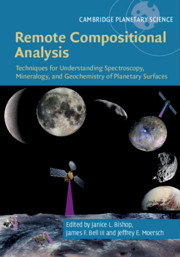 Remote Compositional Analysis
Remote Compositional Analysis Book contents
- Remote Compositional Analysis
- Cambridge Planetary Science
- Remote Compositional Analysis
- Copyright page
- Contents
- Contributors
- Foreword
- Preface
- Acknowledgments
- Part I Theory of Remote Compositional Analysis Techniques and Laboratory Measurements
- Part II Terrestrial Field and Airborne Applications
- Part III Analysis Methods
- Part IV Applications to Planetary Surfaces
- 17 Spectral Analyses of Mercury
- 18 Compositional Analysis of the Moon in the Visible and Near-Infrared Regions
- 19 Spectral Analyses of Asteroids
- 20 Visible and Near-Infrared Spectral Analyses of Asteroids and Comets from Dawn and Rosetta
- 21 Spectral Analyses of Saturn’s Moons Using the Cassini Visual Infrared Mapping Spectrometer
- 22 Spectroscopy of Pluto and Its Satellites
- 23 Visible to Short-Wave Infrared Spectral Analyses of Mars from Orbit Using CRISM and OMEGA
- 24 Thermal Infrared Spectral Analyses of Mars from Orbit Using the Thermal Emission Spectrometer and Thermal Emission Imaging System
- 25 Thermal Infrared Remote Sensing of Mars from Rovers Using the Miniature Thermal Emission Spectrometer
- 26 Compositional and Mineralogic Analyses of Mars Using Multispectral Imaging on the Mars Exploration Rover, Phoenix, and Mars Science Laboratory Missions
- 27 Mössbauer Spectroscopy at Gusev Crater and Meridiani Planum
- 28 Elemental Analyses of Mars from Rovers Using the Alpha-Particle X-Ray Spectrometer
- 29 Elemental Analyses of Mars from Rovers with Laser-Induced Breakdown Spectroscopy by ChemCam and SuperCam
- 30 Neutron, Gamma-Ray, and X-Ray Spectroscopy of Planetary Bodies
- 31 Radar Remote Sensing of Planetary Bodies
- Index
- References
18 - Compositional Analysis of the Moon in the Visible and Near-Infrared Regions
from Part IV - Applications to Planetary Surfaces
Published online by Cambridge University Press: 15 November 2019
- Remote Compositional Analysis
- Cambridge Planetary Science
- Remote Compositional Analysis
- Copyright page
- Contents
- Contributors
- Foreword
- Preface
- Acknowledgments
- Part I Theory of Remote Compositional Analysis Techniques and Laboratory Measurements
- Part II Terrestrial Field and Airborne Applications
- Part III Analysis Methods
- Part IV Applications to Planetary Surfaces
- 17 Spectral Analyses of Mercury
- 18 Compositional Analysis of the Moon in the Visible and Near-Infrared Regions
- 19 Spectral Analyses of Asteroids
- 20 Visible and Near-Infrared Spectral Analyses of Asteroids and Comets from Dawn and Rosetta
- 21 Spectral Analyses of Saturn’s Moons Using the Cassini Visual Infrared Mapping Spectrometer
- 22 Spectroscopy of Pluto and Its Satellites
- 23 Visible to Short-Wave Infrared Spectral Analyses of Mars from Orbit Using CRISM and OMEGA
- 24 Thermal Infrared Spectral Analyses of Mars from Orbit Using the Thermal Emission Spectrometer and Thermal Emission Imaging System
- 25 Thermal Infrared Remote Sensing of Mars from Rovers Using the Miniature Thermal Emission Spectrometer
- 26 Compositional and Mineralogic Analyses of Mars Using Multispectral Imaging on the Mars Exploration Rover, Phoenix, and Mars Science Laboratory Missions
- 27 Mössbauer Spectroscopy at Gusev Crater and Meridiani Planum
- 28 Elemental Analyses of Mars from Rovers Using the Alpha-Particle X-Ray Spectrometer
- 29 Elemental Analyses of Mars from Rovers with Laser-Induced Breakdown Spectroscopy by ChemCam and SuperCam
- 30 Neutron, Gamma-Ray, and X-Ray Spectroscopy of Planetary Bodies
- 31 Radar Remote Sensing of Planetary Bodies
- Index
- References
Summary
Advanced spectroscopic sensors recently flown to the Moon have revealed unexpected discoveries about Earth’s nearest neighbor as well as provided detailed insights and constraints about how early crust evolves on an airless planetary body. Discussed here are (a) global assessment of the variety and distribution of major lunar mineral components and lithologies; (b) some of the remarkable new findings, such as the pervasive presence of OH across the surface and new rock types identified (Mg-spinel anorthosite) that are not identified in current lunar samples; and (c) expectations for the future as additional modern sensors provide a stronger foundation for remote compositional analysis of the Moon. Spectroscopic data continue to provide the cornerstone for identifying and understanding the regional and global character of lunar compositional variations and document key products and processes of crustal evolution.
Keywords
Information
- Type
- Chapter
- Information
- Remote Compositional AnalysisTechniques for Understanding Spectroscopy, Mineralogy, and Geochemistry of Planetary Surfaces, pp. 368 - 392Publisher: Cambridge University PressPrint publication year: 2019
References
Accessibility standard: Unknown
Why this information is here
This section outlines the accessibility features of this content - including support for screen readers, full keyboard navigation and high-contrast display options. This may not be relevant for you.Accessibility Information
- 2
- Cited by